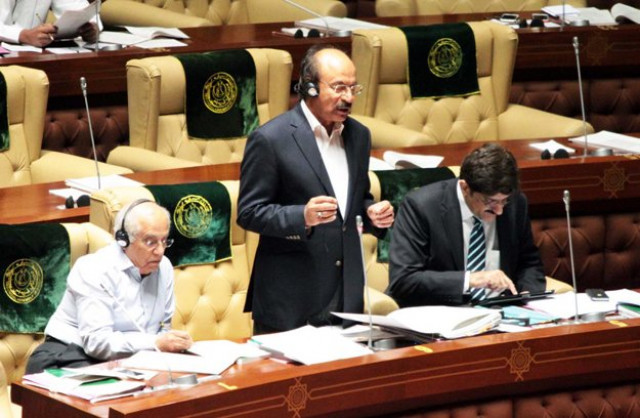Necessary legislation: Assembly passes bill on social security
Law provides benefits to workers in event of sickness, maternity leave, illness or death

PHOTO: ONLINE
Sindh Assembly passed the Sindh Employees Social Security Bill 2016 to introduce a scheme to provide benefits to employees or their dependents in the event of sickness, maternity leave, injury or death. Social security was a federal subject but after the 18th Amendment it became necessary for the provincial governments to make their own laws.
Briefing about the law, senior minister for education and parliamentary affairs Nisar Ahmed Khuhro said after the commencement of this act, the provincial government will establish the Employees Social Security Institute.
The labour minister, a person who is or has been a judge of the Sindh High Court or a provincial official not below the rank of commissioner or secretary, shall be chairperson of the body. The institute's board will comprise four persons representing the government - one each respectively from the departments of labour, industries, health and finance - three persons representing employers and three persons will represent the people whose contributions are payable under this act, all of whom will be appointed by the government.
Regarding payment of contribution, the law said that the employer will have to pay to the institute a contribution at the rate of six per cent of the employers’ earnings. Every worker secured under this law shall be liable to pay through the employer an amount of Rs40 per month as their share to the institution. All contribution paid and all money received on behalf of the institute will be deposited in the fund, which will be administrated by institute.
Benefits
According to the law, the workers of the companies registered with the social security institute will be entitled to receive sickness benefits. A female worker will be entitled to maternity benefits at a rate fixed by the government. The law further said that on the death of a secured employee, the surviving spouse will be entitled to a death grant. In case of injuries, the institute will provide the grant, subject to notification to be issued by government after this act is passed. There will be disablement pension and an employee who is totally or partially disabled while at work will receive a disablement pension fixed by the government. A disablement gratuity will be provided to workers as well.
The government will also notify a social security court, which will be presided over by a judge to be appointed by the government. "Any person aggrieved by a decision of the institution can approach the court, which shall have exclusive jurisdiction to hear and decide the appeal," stated clause 64 of the law.
Any person or employer who refuses to pay the amount or submits false returns will be punished with an imprisonment of three months and a fine of Rs50,000.
Tribute to Sharmeen Obaid-Chinoy
The assembly members paid tribute to Sharmeen Obaid-Chinoy on winning another Oscar for her documentary 'A Girl in the River - The Price of Forgiveness'. A joint resolution was moved by Pakistan Peoples Party (PPP), Muttahida Qaumi Movement, Pakistan Muslim League — Nawaz and Pakistan Muslim League — Functional lawmakers. In their speeches, the MPAs demanded a law against honour killings and accused certain feudal lords and people in power of being "stumbling blocks" in the legislation against karo kari.
The house adopted the resolution unanimously, which reads: "This house congratulates Sharmeen Obaid-Chinoy on winning another "Oscar Award" for her documentary 'Girl in the River — the Price of Forgiveness'. Once again Sharmeen Obaid-Chinoy made Pakistan very proud. This documentary sends out a strong message against the heinous crime of honour killing because there is no honour in these killings."
Published in The Express Tribune, March 1st, 2016.



















COMMENTS
Comments are moderated and generally will be posted if they are on-topic and not abusive.
For more information, please see our Comments FAQ